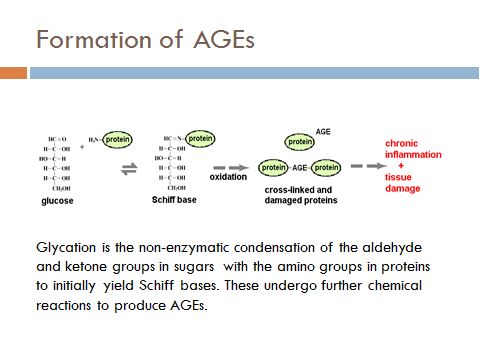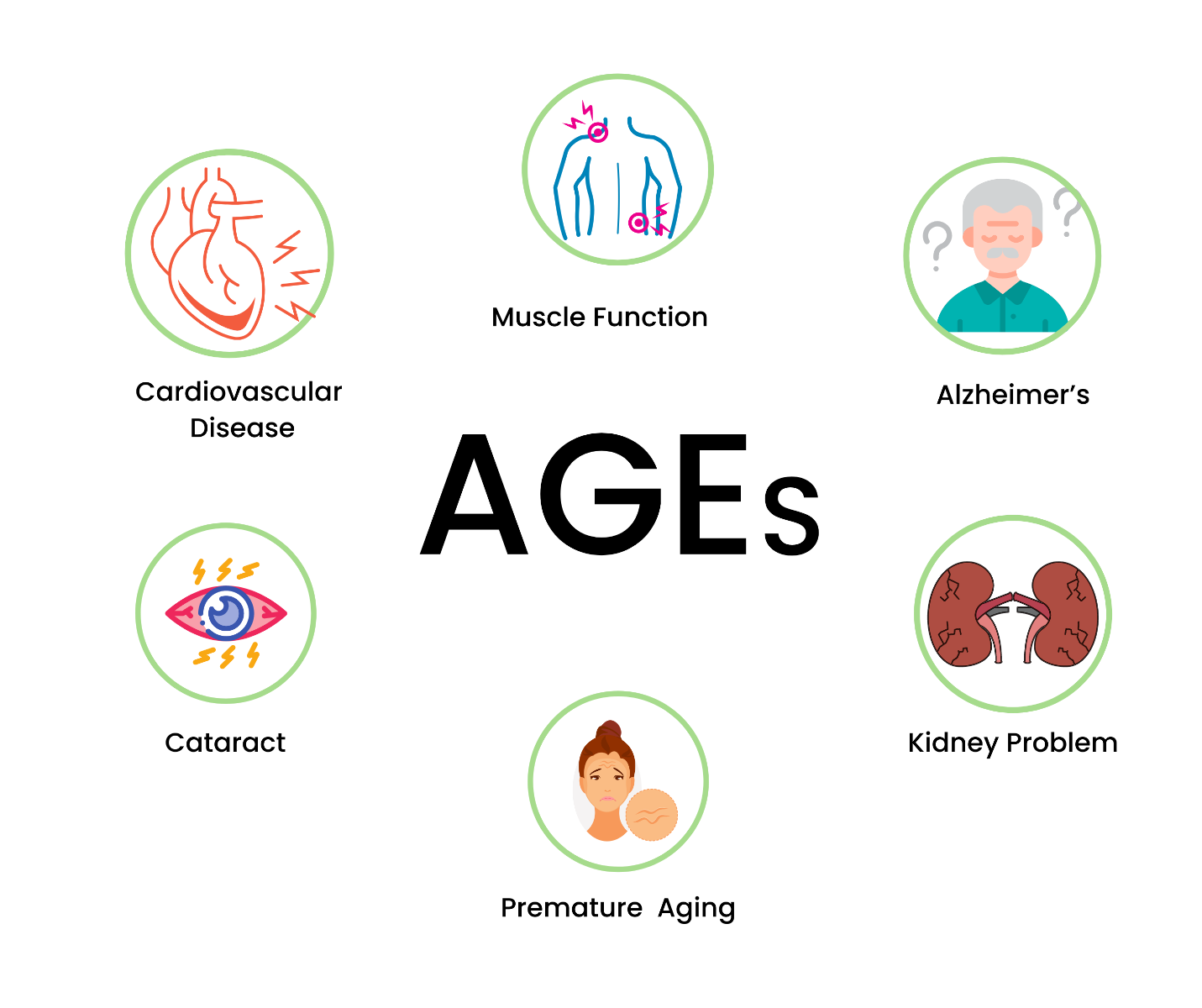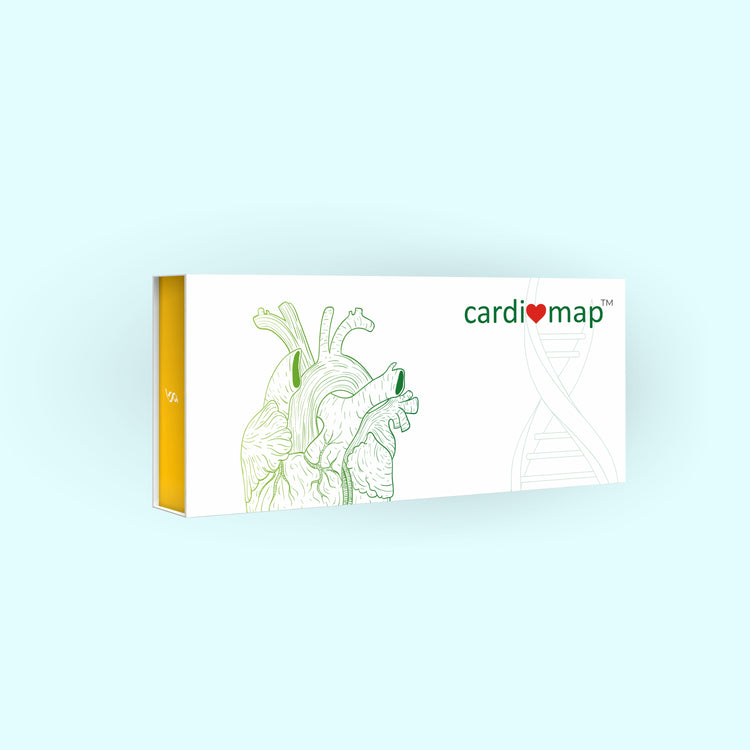Advanced Glycation End Products and Diabetes
Mar 11, 2022
3477 Views
Are you at a higher risk for diabetes? Then you should be aware of Advanced Glycation End Products (AGEs), which increase the risk for diabetes and contribute to its complications. Preventive risk assessment with a genomics test like Genomepatri and regular checks help in leading a risk-free lifestyle.
What are AGEs?
When proteins or fats combine with sugar in the bloodstream, a process called glycation occurs, which leads to the formation of AGEs. Chronic levels of AGEs increase the risk of developing many diseases: diabetes, heart disease, kidney failure, Alzheimer‘s, and premature aging. AGE levels are a marker of overall health. High blood sugar levels enhance the formation of AGEs and so diabetics are at higher risk compared with normal people.
Where do they come from?
Two factors contribute to AGE levels: high blood sugar levels and food choices. Certain cooking methods such as barbecuing, grilling, roasting, baking, frying, sautéing, broiling, searing, and toasting can skyrocket AGE levels. Foods highest in AGEs are meat (especially red meat), certain cheeses, fried eggs, butter, cream, cheese, margarine, mayonnaise, oils, and nuts. Fried foods and highly processed foods also contribute to high AGE levels.

What are the effects?
Apart from causing vascular complications of diabetes mellitus, AGEs contribute to aging and some age-related chronic diseases.
Oxidative stress due to hyperglycemia in diabetics increases AGE levels. They cause crosslinking of collagen leading to vascular stiffening and entrapment of low-density lipoprotein particles (LDL) in the arteries. LDL undergoes glycation, which promotes its oxidation. Oxidized LDL plays a pivotal role in atherosclerosis. AGES on binding with its receptors RAGE (Receptor for Advanced Glycation End Products) causes oxidative stress and activation of inflammatory pathways in vascular endothelial cells that lead to coronary artery disease (CAD).
2. Kidney damage-
AGES enhances kidney damage thereby reducing their removal. This build-up of AGEs forms a positive feedback loop, further increasing the rate of damage.
3. Cataract-
High blood sugar causes enzymes in the lens to convert glucose to sorbitol. Too much sorbitol in the lens leads to cloudy vision adding to cataract development.

4. Muscle function-
AGES is one of the major reasons for reduced muscle activity.
5. Alzheimer’s-
Oxidative stress due to AGEs can cause neuronal dysfunction or death. The exact mechanism of how AGES increases the risk for Alzheimer’s disease is unclear.
6. Premature aging-
AGE causes oxidative and inflammatory damage in tissues promoting the formation of reactive oxygen species, which enhances aging.
Plan, Execute and Live
Among lifestyle modifications, dietary measures play a pivotal role in lowering AGE levels.
- Cooking strategies such as brief heating time, low temperatures, high moisture, and/or exposure to an acidic solution reduces the formation of new AGES in food. Poaching or steaming reduces AGEs in chicken four times compared against roasting or broiling.
- Marinades such as lemon juice and vinegar inhibit the new formation of dietary AGEs. For example, marinated beef has half the amount of AGEs compared against non-marinated beef.
- The dietary guidelines as per the American Heart Association, the American Institute for Cancer Research and the American Diabetes Association are: consumption of fish, legumes, whole grains, low-fat milk products, fruits and vegetables are favourable in reducing dietary AGEs.
- Dietary interventions can minimize the absorption of AGEs via the gastrointestinal tract and reduce the levels of its circulation. Therefore, long term intervention with a low AGEs diet may also reduce the pool of AGEs.
- Dietary changes and interventions work together in inhibiting the formation of endogenous AGEs.
Therapeutic measures:
- Strict compliance to prescribed drugs helps in maintaining optimum drug levels in the bloodstream, increasing their efficacy.
- Regular monitoring of blood sugar levels by HbA1c every 3 months and maintaining < 7.0.
- Frequent consumption of small meals can help in avoiding hypoglycemic episodes. If there are frequent hypoglycemic episodes, the treating physician may recommend necessary dose adjustments.
Stress Busters:
- Relaxing your mind with music for a few minutes every day. What is your stress buster music list?
- Breathing exercises, yoga, or meditation can help you to reset. Music apps such as Spotify come with meditation or relaxation playlists to unplug your mind and focus your energy.
- Be optimistic
- Get enough sleep
Prevention is the only way
The formation of advanced glycation end products appears to be enhanced in diabetics as a result of hyperglycemia. Increased glycation and accumulation of glycated plasma proteins have an important role in the pathogenesis of various diseases. A group of compounds are generated that appears to activate the intracellular signalling pathways and generation of proinflammatory and prosclerotic cytokines, which further leads to the development and progression of diabetic complications.
So do not pay unnecessary wages instead take simple measures to reduce or inhibit AGE formation and maintain near optimum health.
How can Mapmygenome help you?
- Understand your risk for diabetes with Genomepatri
- Work with our genetic counselors for a health plan to proactively reduce AGEs.
- Regular health checks and tools to prevent/manage diabetes and related complications.
Sources:
1. Singh, Varun Parkash, et al. "Advanced glycation end products and diabetic complications." The Korean journal of physiology & pharmacology 18.1 (2014): 1-14.
2.https://www.healthline.com/nutrition/advanced-glycation-end-products#what-they-are
3. Chen, Jie-Hua, et al. "Role of advanced glycation end products in mobility and considerations in possible dietary and nutritional intervention strategies." Nutrition & metabolism 15.1 (2018): 1-18.

